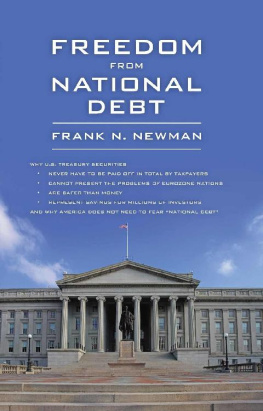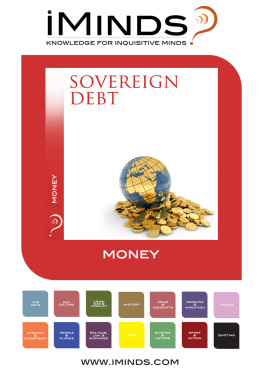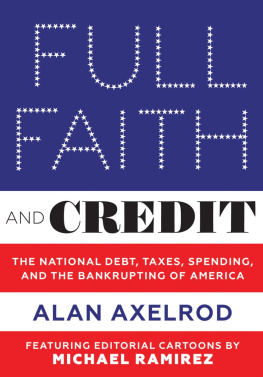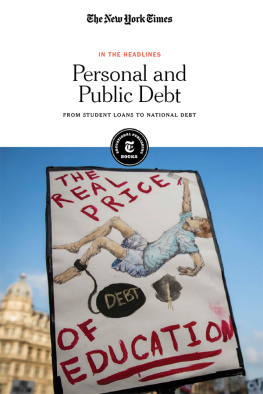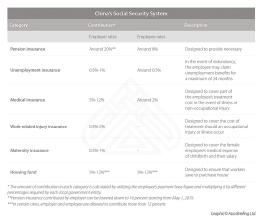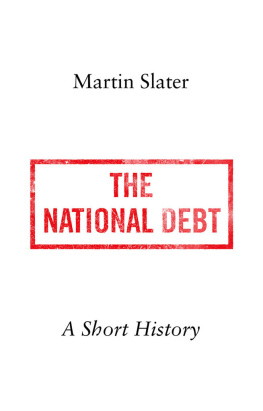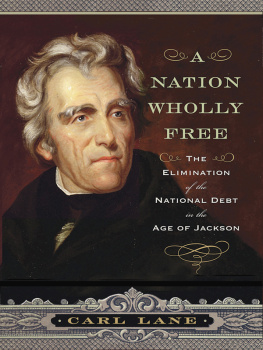T hanks to my wife, Liz, for her continuous support, encouragement, and thoughtful questions. Thanks to good friends with strong but open minds who offered perceptive comments and suggestions.
Thanks especially for the valuable help from my son, Daniel Newman, who edited this book, and helped me work through some of the most challenging aspects of the logic and the implications. Many of the ideas in the book were developed by testing initial thoughts with him, drawing on his strong insights and broad range of knowledge. The analysis and exposition are sharper and more clear as a result of his help.
Introduction
A mericas worries about national debt have come to dominate national debate on a wide range of public policy issues. Discussions of national undertakings including infrastructure repair, jobs programs, military modernization, disease prevention, and international strategy - have all been stifled because of this fear. America has convinced itself that it can no longer afford, as a nation, to do many of the productive things that it has done so well over its history.
Thats a great shame, not just because America remains a nation of tremendous resources in every sense, but because the underlying assumptions about U.S. government financial instruments are not correct. America can never face the debt problems of nations like Greece, because it has a fundamentally different financial system.
This short book explains why such fears should not hold back America, and why even the expression national debt is neither meaningful nor appropriate for the United States.
The book asks some underlying questions: What does national debt really mean in the modern financial system of the U.S.? What harm has it actually done to America? Why have none of the frequent predictions about terrible consequences of U.S. Treasury issuance come true? Why do some countries, despite large amounts of government securities relative to GDP, have very strong government bond markets, while bonds of several eurozone countries face major challenges? The conventional views just do not provide coherent and convincing explanations. Its time to think in new ways about the underlying assumptions. The book explores these and other related issues, stepping back to think anew about the fundamentals.
In so doing, this book puts the expression national debt in quotation marks when referring to U.S. Treasuries, since they do not actually constitute debt in the sense commonly implied. The term debt carries connotations that are strongly challenged by the analysis here, and the quotation marks are intended to invite the reader to step back and look at the underlying issues.
Many people believe that the government has to borrow good, safe money from the public, and that someday well be taxed in order to repay the debt. But that established view does not properly reflect the modern U.S. financial system, in which national debt is an expression for U.S. Treasury securities, issued in U.S. dollars. The book addresses what money really is in a modern financial system, and how it relates to Treasuries, and then explains why America has no financial instruments that warrant the term national debt.
This is a critical issue for economic policy in America - and around the world. Misunderstanding of the modernnature of money and Treasuries (or their equivalents in other countries) needlessly confines thinking about economic approaches to reducing unemployment and growing GDP. The reasons often alleged for fear of national debt are not valid for the U.S. and other nations with similar structures of financial systems. There is a very different situation for the eurozone nations and other countries that raise funds in currencies that are not their own. Greece, Portugal, Ireland, and other nations that do not have their own currencies and financial systems do have obligations that should be considered national debt.
America can have freedom from fear of national debt by recognizing the real nature of the Treasury securities that are referred to by that expression, and their relationship to what is called money. The concerns are left over from an earlier time, when the U.S. financial system was very different.
Of course, the conclusions that the U.S. does not really have national debt in the usual sense of the expression, and that we should not worry about it or hold back economic programs out of fear of it, may seem radical to some, and the book tries to explain the logic carefully. It addresses a number of the common concerns, analyzing each one to explain why it is not really an issue to fear.
Once the alleged reasons for that fear have been demonstrated to be unfounded, then it becomes possible to move on to key policy issues, including high unemployment and slow growth, and to options such as infrastructure and defense maintenance and modernization, and tax reduction. This is not the only issue for the U.S. economy, of course, but is hugely important, and influences many other aspects of our economy, the lives of millions of people, and Americas position in the world.
Freedom from these concerns does not mean that annual deficits should be ignored. The book explains why, in times of a cold, slow economy, with high unemployment, heat deficits for economic support, through government spending programs such as infrastructure, and lower taxes can help greatly. In times of a very hot economy, with low unemployment and high capacity utilization, air conditioning reduction in the deficit is appropriate. And, programs to control deficits ten years from now, when we hope the economy will be hot, are important. But none of these issues need be influenced by concern over the amount of Treasury securities outstanding.
This book uses some of the analysis developed in the authors recent book Six Myths that Hold Back America - And What America Can Learn from the Growth of Chinas Economy (Six Myths). That book challenges some basic concepts of current economic thinking, and reaches some unconventional conclusions from logic about the financial system, including:
- Saving cannot generate productive business Investment; its the other way around: Investment generates economic Saving.
- Deficits do not reduce national Saving or Investment.
- Issuance of Treasury securities (deficit financing) cannot use up equivalent amounts of funds intended for private-sector use.
The theme of this book is very different from traditional views, but is based on a logical approach to looking at the financial system. Six Myths contains one quotation from John Maynard Keynes; it fits so well here that Ill repeat it before beginning the exposition and analysis:
The difficulty lies, not in the new ideas, but in escaping from the old ones....
Chapter 1
What is Money?
The nature of money and Treasuries
I n order to fully understand the nature of Treasury securities (national debt), we need first to focus on what money really is.
Many people think of money in addition to being a medium of exchange to buy and sell things - as the real thing for a financial asset, the good, safe stuff. They think of the government as borrowing this good, reliable value from investors who need incentives to invest their secure money in Treasuries. And many people who have been lectured a thousand times about the evils of national debt believe that the U.S. government will have to generate enough money revenue, through future taxes, to pay off all the Treasury securities that have been issued to finance deficits.

